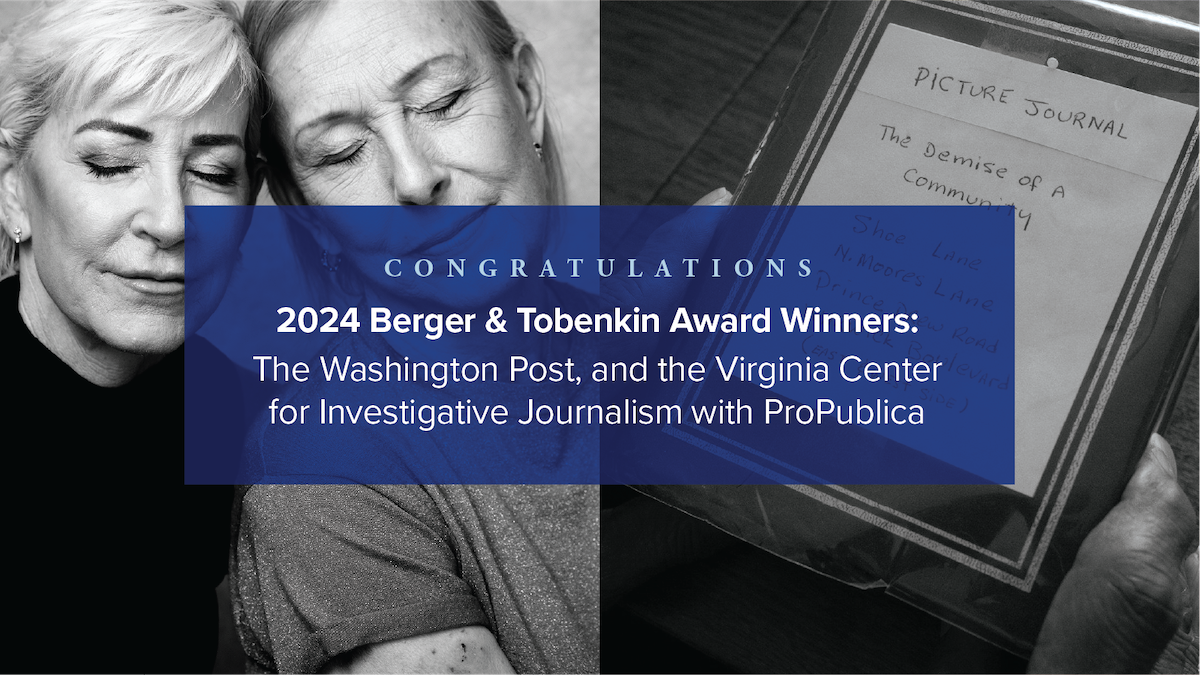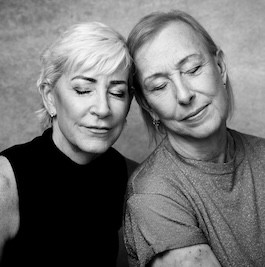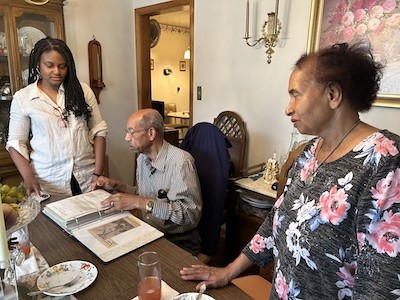Announcing the 2024 Winners of the Mike Berger Award & the Paul Tobenkin Memorial Award
Reporters from The Washington Post and the Virginia Center for Investigative Journalism at WHRO & ProPublica have won the 2024 Berger Award and Tobenkin Award, respectively.


Sally Jenkins, sports columnist for The Washington Post, has won the 2024 Meyer “Mike” Berger Award for “Bitter Rivals. Beloved Friends. Survivors,” a richly nuanced story of the entwined rivalry and friendship of two tennis icons, Chris Evert and Martina Navratilova. Jenkins tells how the two women fought each other fiercely on the highest level of their sport and developed a bond that deepened further after 50 years, when both were diagnosed with cancer.
Exhaustively reported and beautifully written, Jenkins' piece is a great love story told with rigor, precision, and rare sensitivity. She has been writing about Navratilova and Evert for nearly four decades. The trust she built with her subjects allowed her to craft an incredibly intimate and personal story that immediately resonated with readers. Named after the late New York Times reporter Meyer “Mike” Berger, the Berger Award is given annually to a reporter(s) for an outstanding example of in-depth, human interest reporting. The award carries a $1,500 honorarium.

Brandi Kellam, an investigative journalist with the Virginia Center for Investigative Journalism (VCIJ) at WHRO, and Louis Hansen, an editor and investigative journalist at VCIJ, have won the 2024 Paul Tobenkin Memorial Award for the series of stories "Uprooted". Their reporting showed how the expansion of a university destroyed a once-vibrant Black community in Newport News, Virginia. The series was the result of a collaboration between ProPublica and the Virginia Center for Investigative Journalism at WHRO that revealed racial injustice in a largely overlooked arena: the location and expansion of state universities since World War II. Through the prism of public higher education in Virginia, this groundbreaking series illuminated how universities nationwide have taken advantage of federal funding and court rulings to displace tens of thousands of Black families, often seizing property by eminent domain. The Paul Tobenkin Award, named in honor of the late New York Herald Tribune reporter, recognizes outstanding achievements in reporting on racial or religious hatred, intolerance, or discrimination in the United States. The award also carries a $1,500 honorarium.
Other contributors to the reporting include: former ProPublica research reporter Gabriel Sandoval, Christopher Tyree of Virginia Center for Investigative Journalism at WHRO, and Lisa Riordan Seville and Mauricio Rodríguez Pons, both of ProPublica.
2024 Berger Award Jurors’ Citation
Sally Jenkins' richly nuanced story of the entwined rivalry and friendship of two tennis icons, Chris Evert and Martina Navratilova, won the Meyer Mike Berger Award for human interest reporting. Published in The Washington Post, "Bitter rivals. Beloved friends. Survivors." tells how two women fought each other fiercely on the highest level of their sport and developed a bond that deepened further after 50 years, when both were diagnosed with cancer. Exhaustively reported and beautifully written, Jenkins' piece is a great love story told with rigor, precision, and rare sensitivity.
Jurors: David Hajdu, Alisa Solomon, Alexander Stille
2024 Tobenkin Award Jurors’ Citation
In this powerful series, reporters Brandi Kellam and Louis Hansen from the Virginia Center for Investigative Journalism showed how the expansion of a university destroyed a once-vibrant Black community in Newport News, Virginia. The series digs deep into the city's race-based policies and the personal stories of those affected by the expansion, and how it reflects a disturbing pattern in higher education. The investigation showed that as Christopher Newport University's expansion squeezed out Black homeowners, its enrollment of Black students plummeted to 8 percent from 17 percent in 1996. Since its publication, the series spurred the creation of a task force by the city of Newport News and Christopher Newport University to examine the property acquisitions and make suggestions for some restorative justice for the displaced.
Jurors: Elena Cabral, Ty Lawson, Habiba Nosheen